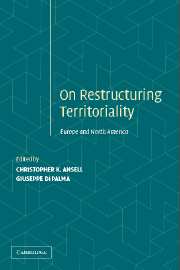Book contents
- Frontmatter
- Contents
- Contributors
- Acknowledgments
- Restructuring Territoriality
- I THEORETICAL FRAMEWORKS
- II THE TRANSFORMATION OF GOVERNANCE
- 4 Sovereignty and Territoriality in the European Union: Transforming the UK Institutional Order
- 5 Social Citizenship in the European Union: Toward a Spatial Reconfiguration?
- 6 Islands of Transnational Governance
- 7 Regional Integration and Left Parties in Europe and North America
- III EUROPE–U.S. COMPARISONS
- VI CONCLUDING THOUGHTS
- Reference List
- Index
5 - Social Citizenship in the European Union: Toward a Spatial Reconfiguration?
Published online by Cambridge University Press: 03 December 2009
- Frontmatter
- Contents
- Contributors
- Acknowledgments
- Restructuring Territoriality
- I THEORETICAL FRAMEWORKS
- II THE TRANSFORMATION OF GOVERNANCE
- 4 Sovereignty and Territoriality in the European Union: Transforming the UK Institutional Order
- 5 Social Citizenship in the European Union: Toward a Spatial Reconfiguration?
- 6 Islands of Transnational Governance
- 7 Regional Integration and Left Parties in Europe and North America
- III EUROPE–U.S. COMPARISONS
- VI CONCLUDING THOUGHTS
- Reference List
- Index
Summary
Since the nineteenth century, the social rights of citizenship have played a crucial role for the process of state and nation building in Europe. Such rights have given rise to wide “collectivities of redistribution” that have strengthened cultural identities, enhanced citizen loyalties to public institutions, and promoted a sharing of material resources throughout the social structure, thus easing civic and political cohesion. The European nation-state is typically a welfare state; the social components of citizenship are no less important than its civil and political components; the right to decide about the forms and substance of social citizenship has always been considered in its turn a crucial aspect of national sovereignty.
The dynamics of globalization and, more specifically, of European integration have been gradually challenging this institutional configuration. In the last couple of decades, the social dimension of national sovereignty has been increasingly undermined by a number of factors. The “right to decide” on social policy matters of each individual state has become less comprehensive and “ultimate” than it used to be. Globalization and European integration have modified the context in which national welfare states operate, offering new constraints and new opportunities to citizens/consumers, producers and delivering agencies, as well as policy makers (in the widest sense). In the debate, the new challenges to social sovereignty are primarily discussed with reference to highly significant, but mainly indirect, developments: the increased mobility of capital, the greater volatility of international financial markets and their power to condition domestic choices, the constraining rules of new supranational regimes (typically the European Monetary Union [EMU]), rising migration flows, and so on.
- Type
- Chapter
- Information
- Restructuring TerritorialityEurope and the United States Compared, pp. 90 - 121Publisher: Cambridge University PressPrint publication year: 2004
- 4
- Cited by



